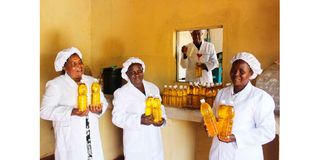Sh29 billion in contracts, but no money to deliver: The catch-22 killing women's business dreams

Kinyoo Women AIPCA group members show the final product of sunflower oil they manufacture at their micro processing plant in Imenti Central. Despite 30 per cent procurement quotas, funding barriers keep women entrepreneurs locked out of government opportunities.
What you need to know:
- Women entrepreneurs are winning government contracts worth billions but lack the funding to deliver on them.
- Despite receiving Sh29.88 billion (58 per cent of targeted procurement), complex insurance requirements and limited access to capital create barriers.
"There are government tenders you want to apply for, but then you ask yourself: how will I deliver the services if I win the tender?" confessed one woman entrepreneur at a UN Women forum on gender-responsive procurement held in Nairobi on July 2, 2025.
She was not alone. Many women at the forum echoed the same concern—the lack of funding to deliver on government contracts remains a major hurdle.
"Women entrepreneurs still face barriers such as limited access to capital, markets, information, and networks," noted Antonia N'Gabala-Sodonon, UN Women Country Representative.
Enhanced resilience
She emphasised that gender-responsive procurement (GRP) benefits all parties involved. "It strengthens supply chain diversity, bringing fresh perspectives and local insights that fuel innovation," she said.
"Companies adopting GRP report cost savings, enhanced resilience, and improved environmental, social, and governance performance—key priorities for both investors and consumers."
Yet the question remains: how can women overcome the credit barrier to capitalise on the 30 per cent procurement quota for women, youth, and persons with disabilities?
According to Bartholemew Kinoti, Principal Economist at the National Treasury, the credit guarantee scheme offers one solution. He explained that the scheme allows the government to partially guarantee loans issued by participating financial institutions to micro, small, and medium enterprises (MSMEs), thereby sharing the risk of default with lenders.
Participating banks include Absa Bank, Credit Bank, Diamond Trust Bank, KCB Bank, NCBA Bank, Stanbic Bank, and Co-operative Bank.
"The total value of contracts awarded to the three categories—women, youth, and persons with disabilities—in the 2024/2025 financial year was Sh51.18 billion," Kinoti said. "Of this, women entrepreneurs received Sh29.88 billion, representing 58.31 per cent of the total value under the Access to Government Procurement Opportunities program."
He added that youth were awarded Sh16.89 billion (33 per cent), whilst persons with disabilities received Sh4.45 billion, accounting for 8.69 per cent.
But how does the credit guarantee scheme work?
According to the National Treasury website, the maximum loan amount available under the scheme is Sh5 million. However, a bank manager from one of the participating institutions, who requested anonymity, explained that they still require risk mitigation.
"For instance, if you win a Sh100 million tender, you'll need to insure 75 per cent of that amount," the bank official explained. "In case of default, the insurer will cover the amount because this is business—we can't afford to lose money. The remaining 25 per cent will be your responsibility in the event of non-performance. The insurance serves as collateral, and once that's in place, we can provide 100 per cent financing."
The forum highlighted a crucial point: access to such information is vital if women are to compete effectively and deliver on government contracts. Participants called for enhanced training on accessible financial tools to bridge this knowledge gap.


